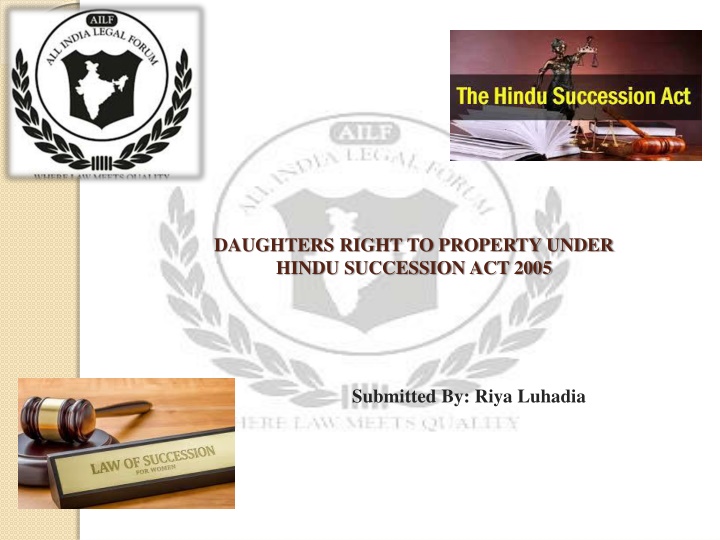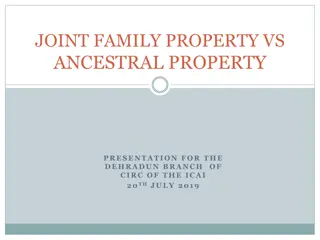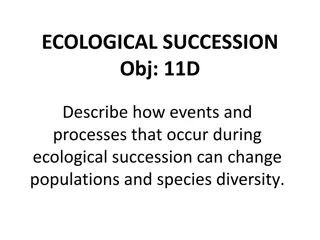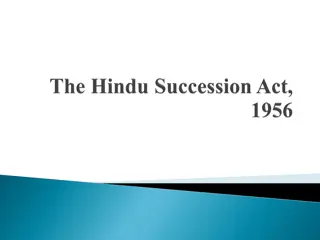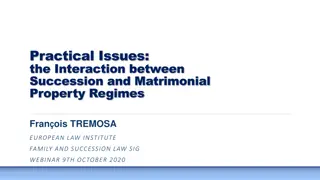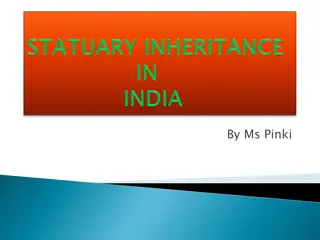Daughters' Rights to Property Under Hindu Succession Act 2005: A Comprehensive Overview
The Hindu Succession Act of 2005 brought about significant changes, granting daughters equal rights to ancestral property. This article delves into the historical background, key provisions, landmark legal cases, and the impact of the amendment on daughters' inheritance rights. It also explores the challenges faced in succession disputes, the evolution of succession laws, and the strive for equality in property rights between sons and daughters.
Uploaded on Sep 24, 2024 | 2 Views
Download Presentation

Please find below an Image/Link to download the presentation.
The content on the website is provided AS IS for your information and personal use only. It may not be sold, licensed, or shared on other websites without obtaining consent from the author.If you encounter any issues during the download, it is possible that the publisher has removed the file from their server.
You are allowed to download the files provided on this website for personal or commercial use, subject to the condition that they are used lawfully. All files are the property of their respective owners.
The content on the website is provided AS IS for your information and personal use only. It may not be sold, licensed, or shared on other websites without obtaining consent from the author.
E N D
Presentation Transcript
DAUGHTERS RIGHT TO PROPERTY UNDER HINDU SUCCESSION ACT 2005 Submitted By: Riya Luhadia
INTRODUCTION OBJECTIVES HISTORY TIMELINE CLASSIFICATION OF PROPERTIES IMPORTANT FEATURES OFTHE Hindu SUCCESSION ACT,1956 2005AMENDMENT PARCHURI SAMBASIVA Vs. PARCHURI SIRINIVASAARAO CASE LAW PRAKASH VS. PHULWATI CASE LAW DANAMMAVS AMAR CASE LAW VINEETA SHARMAVS. RAKESH SHARMA CASE LAW DRAWBACKS IN THE HINDU SUCCESSION ACT,1956 DAUGHTER S RIGHT OVER PROPERTY MARRIED DAUGHTER RIGHTS ON FATHER S PROPERTY BENEFITS OFAMENDMENT 2005 CONCLUSION SELF ACQUIRED FATHER S
Through the Hindu Succession Amendment Act 2005 there is a change in the status of daughter s right to property and now both son and daughter have the equal share in the father s property without any discrimination which was not the same before the amendment in 2005 that is in Hindu Succession Act 1956. Because in this only the sons and the male heirs have the right in the father s property and not the daughters. Basically now the daughters right in property has also been acknowledged eventually. Now daughters are also treated as the coparcener in same way as that of son.
To know about the daughters right to property in The Hindu Succession (Amendment) Act, 1956 amended in the year 2005. To analyze the effectiveness and practical implications of the amendment in process of succession. To study the benefits of the Amendment taken by daughters in legal process for enforcement of their right to property. To study the awareness and adoption of amendment in courts and Government offices. To maintain equality between the son and the daughter in anyway possible so as to have no discrimination on any basis.
Earlier if there were any disputes between the families then there were laws made according to their own customs and traditions which many a times has created problem in resolving the disputes and basically the karta of the family deals with that. If the dispute is bigger then the panchayats have been set up to resolve the same but as they were also not much well aware with the laws so it also becomes difficult to resolve the problems. Then at the time of British rule there were civil and criminal courts establishes which deals with the concerned matters and panchayat also did not interfere in the same. And after that India Succession Act 1925 came into operation on 30th September 1925 because different communities were governed by different laws and custom so to have a standard laws for all communities so that they can be judge in fair and reasonable manner. Thus came the India Succession Law.
There again some problems while solving disputes among the communities arises as they have different customs and traditions through which they were governed. Then The Hindu Succession Act, 1956 came into operations which deals with the succession laws related to property and how this should be divided after the death of the owner of the property. Coparcenary rights were given to the sons but after the amendment in Hindu Succession Act 2005 daughters were also given the same right which was finally given in the recent judgment by Supreme Court in case of Vineeta Sharma vs. Rakesh Sharma ,AIR 2020.
There are two types of property Ancestral Property : The property that is inherited up to three generations is known as ancestral property. This is a component of the coparcenary property. This is the property descends from father , grand father and great grand father. 1. Self-Acquired Property : Property which is acquired by a person during his lifetime by his own means. The partition of self acquired property can be done in whatever manner according to the wish of the owner as per or by his will. 2.
This Act covers all intestate succession except to the property of a person who is married and governed by the provisions of Special Marriage Act, 1954 apply and to impartibly estate of rulers of India estate, succession to which is regulated by special covenants or agreement in any existing enactment. The act modifies in certain respects law relating to Joint Family Property, now the undivided interest of Mitakshara coparcener in JFP on his death does not necessarily developed by an absolute rule of survivorship, but may go by any of the following modes. By testamentary disposition. By survivorship. By rule of intestate succession. No person shall be disqualified from succeeding on the ground of any disease, defect, or deformity or any other ground not provided in the act (section 28)
As per the act only male descendents were classified as coparceners. And that also up to 3 generations only. No female descendents could claim their right on the ancestral property and this rule is called the survivorship rule. Coparcener is a person who shares the property or divide equally with others in the inheritance of an undivided estate or in the rights to it . They can claim their rights.
In the latest Supreme Court Judgment Justice Arun Kumar Mishra quoted that-
The amendment cancelled the survivorship rules and introduces testamentary and intestate succession. It states that if any person dies before making a will or for the ancestral property then coparcener will be : Widow Son Daughter And all of the three will have the equal rights Basically, daughters were declared as the coparceners.
PARCHURI SAMBASIVA Vs. PARCHURI SIRINIVASAARAO In Parchuri Sambasvia Vs. Parchuri Srinivasaarao (2007) 59 AIC 14 AP, it was held that the daughter becomes coparcener after The Hindu Succession (Amendment) Act, 2005. The right of the daughter as coparcener in family property arises only after the amendment of 2005 has taken place. Before the amendment daughter do not have the right of coparcenary since birth as that of the son.
In 2016 Prakash vs. Phulwati case, Supreme Court ruled that it is mandatory that the person whose property is being divided should be alive at that time. Which means if a person dies before 9thSeptember 2005, then Hindu Succession Act 2005 will be followed and will be applicable. Daughters cannot claim their right. If father is alive at this date then only living coparcener s right goes to living daughter which means if father is alive then his daughter can claim the right otherwise not.
Supreme Court in this case ruled that, it is not mandatory that a person whose properties are divided must be alive . If a person dies before 9thSeptember 2005, then also daughters can claim their rights. This means if father is not living on the date of 9thSeptember 2005 then also daughter will get the right. Basically it was opposite of what said in the earlier case judgment which creates confusion among the people regarding the daughters right in her fathers property.
In the recent 2020 case, which has been recently seen in the news, the confusion which was created by the earlier two verdicts in 2016 and 2018 case were resolved. In the recent case Supreme Court ruled that women s right to the ancestral property is by birth in the same way as the sons have. This means that the women s has the right to ancestral property by birth no matter whether the father is alive at that time or not.
There was clear and visible discrimination between the daughter and the son regarding the succession of the property. Daughters were not be treated as equal to son in respect of property division as daughter was not considered as the coparcener. There was the rule of survivorship which means Females cannot claim for partition Daughters have right of residence only when she is married, deserted or widowed. Son has inherited birth right in Joint Family Property as a coparcener but a daughter cannot.
Whether the daughter is married or not she has the right in father s property in the same manner as the son have.
Daughters have a right in fathers self acquired property in the same manner as the sons have. If the father has prepared the will and there none of the son an daughter is mentioned then that will also be considered as valid because it is fathers self property he can give to anyone he desires. But if that property is given to the son then daughter will also have the equal right and she can claim that right because for parents both son and the daughter are their children so there should be no discrimination on this basis. Self acquired property is divided according to the wish of the father because he had earned it himself and he can do whatever he likes to his property.
Basically daughters after marriage is governed by the laws of husband that is according to Hindu Marriage Act,1955 but if the daughter is not married then she will be governed by the laws of her father according to Hindu Succession Act,1956. But even after marriage also daughters can have the right in their fathers property no matter the property is ancestral or self-acquired in the same manner as the sons have. In many of the cases daughters does not demand for the property out of affection but in some cases it can be happened and in that cases she can claim her right and file the suit of partition.
It attempts to remove the discrimination between the son and the daughter which was contained Section 6 of The Hindu Succession Act, 1956. By deleting the major clause of discrimination which was section 4(2) of The Hindu Succession Act, 1956. Son and the daughter both have right and liability from the date of the birth as a coparcener in Joint Family Property. Daughters whether married or unmarried has the right to claim on father s property and file the suit of partition. Aremarried daughter can inherit the property even if they remarried. Women can also become the Karta of the family. Focused on the equality between the son and the daughter.
Daughters right on fathers property in same way as the sons is a great initiative taken by court to remove discrimination between the son and the daughter. Daughter is also the child of the father in same way as the son so she should also be given all rights and opportunities as the son is given. Because betterment of both the son and the daughter in necessary without any discrimination on any basis. Now in the property rights females can claim and have legal remedy against it. India being a land of discrimination is trying to remove discrimination by small initiatives so that one day it becomes equal for all if the aim of ending discrimination continues.
